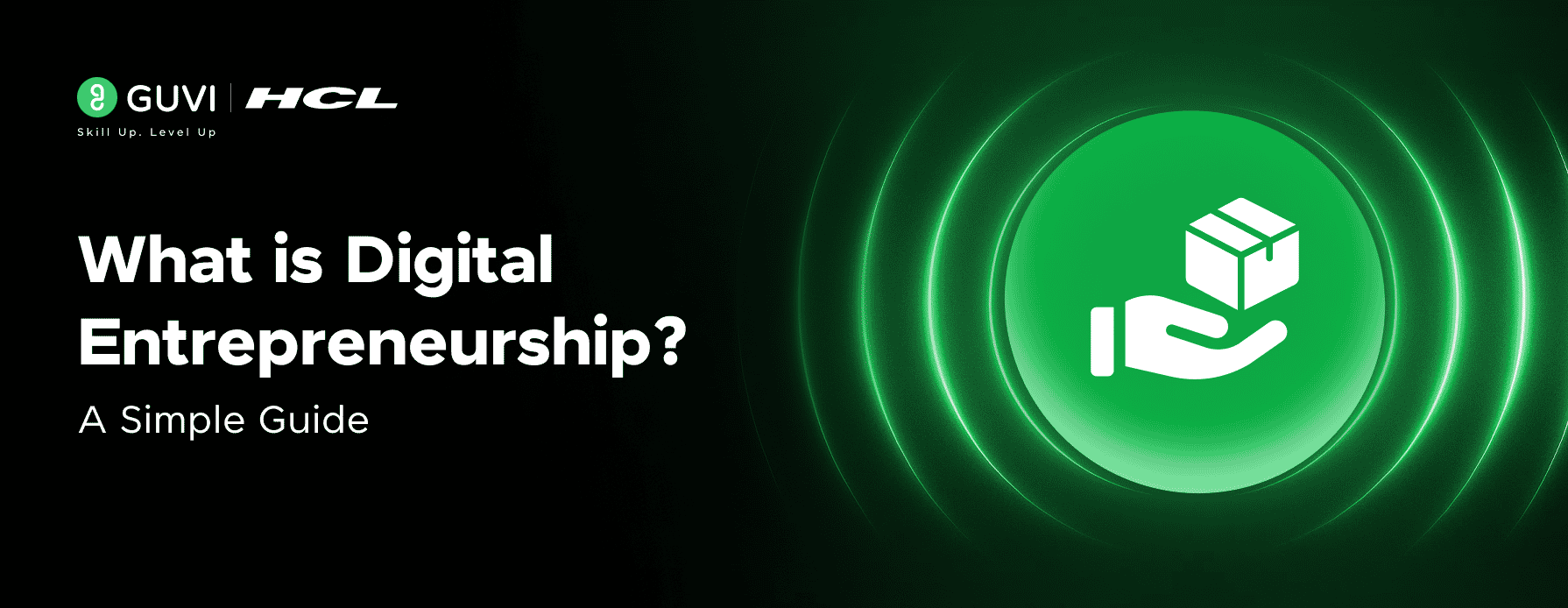
What is Digital Entrepreneurship? A Simple Guide to Starting in 2025
Oct 08, 2025 6 Min Read 2994 Views
(Last Updated)
What is digital entrepreneurship? It’s a business approach that lets you create and run ventures entirely online, reaching customers globally while keeping costs low. Companies like Shopify, Slack, Airbnb, and OpenAI all started as small digital ventures before growing into industry giants.
Now that I’ve answered the very basis of this article, let’s discuss digital entrepreneurship and how it offers remarkable advantages compared to traditional business models. You can operate with minimal overhead, quickly adapt to market changes, and scale without physical expansion.
This guide will tell you everything you need to know about digital entrepreneurship, its basics, types and how you can become a digital entrepreneur as a beginner as well. Let’s begin!
Table of contents
- What is Digital Entrepreneurship?
- How does it differ from traditional entrepreneurship
- Why Digital Entrepreneurship is Growing
- 1) Global internet access and digital tools
- 2) Low startup costs and high scalability
- 3) Changing consumer behavior
- Types of Digital Entrepreneurship
- 1) E-commerce and dropshipping
- 2) Content creation (blogging, YouTube, podcasting)
- 3) Online services and freelancing
- 4) Digital products (courses, eBooks, templates)
- 5) Community and membership platforms
- How to Become a Digital Entrepreneur: Step-by-Step
- Find your niche or idea
- Validate your market
- Build your online presence
- Launch your product or service
- Promote using digital marketing
- Skills and Tools You’ll Need to Become a Digital Entrepreneur
- 1) Basic tech and marketing skills
- 2) Popular tools for websites, email, and payments
- 3) Time management and adaptability
- 4) Understanding customer needs
- Concluding Thoughts…
- FAQs
- Q1. What exactly is digital entrepreneurship?
- Q2. How much can digital entrepreneurs earn?
- Q3. What skills do I need to become a digital entrepreneur?
- Q4. What are some popular types of digital entrepreneurship?
- Q5. How do I start my journey as a digital entrepreneur?
What is Digital Entrepreneurship?
Digital entrepreneurship refers to building and managing a business venture that leverages internet platforms, digital tools, and online channels to create value. Unlike physical businesses, these ventures exist and operate in the digital realm.
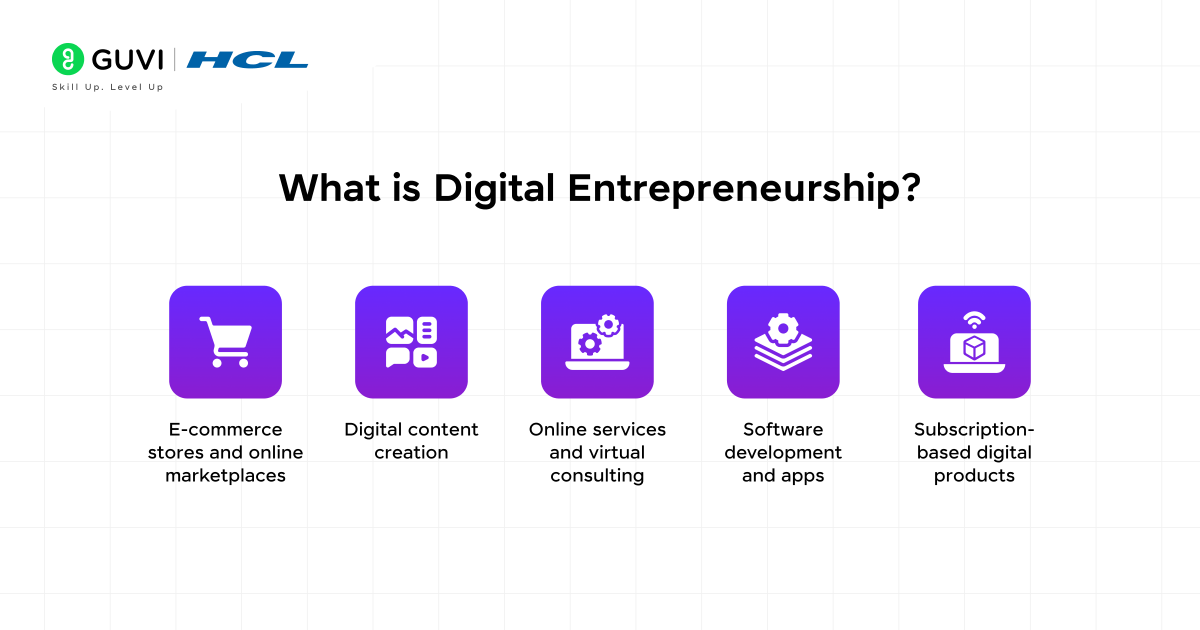
Essentially, digital entrepreneurship combines business acumen with technological innovation to create new opportunities online. Digital entrepreneurs utilize technology as an advantage in both internal operations and external customer interactions. They operate businesses that may include:
- E-commerce stores and online marketplaces
- Digital content creation (blogs, podcasts, videos)
- Online services and virtual consulting
- Software development and apps
- Subscription-based digital products
The beauty of digital entrepreneurship lies in its accessibility. You can start with minimal resources, often needing just a computer, an internet connection, and your skills. Furthermore, these businesses typically have lower overhead costs, making them more resilient to market fluctuations.
How does it differ from traditional entrepreneurship
Traditional and digital entrepreneurship represent two distinct business approaches with fundamental differences:
- Location and Reach: Traditional businesses primarily operate from physical locations with geographical limitations. In contrast, digital entrepreneurs work from anywhere with internet access, reaching customers globally 24/7.
- Startup Costs: Digital ventures generally require significantly lower initial investment than traditional businesses. There’s no need for physical retail space, inventory storage, or extensive staff.
- Scaling Methods: For traditional businesses, scaling often means opening new locations, increasing inventory, or hiring more staff. Digital businesses scale through systems, automation, and partnerships without proportional cost increases.
- Customer Relationships: Traditional entrepreneurs typically form in-person relationships with customers. Digital entrepreneurs build relationships virtually through content, email, social media, and other online touchpoints.
- Market Testing: Digital entrepreneurs can test ideas quickly with minimal risk, allowing for rapid adaptation based on real-time data and feedback.
Why Digital Entrepreneurship is Growing
The explosive growth of digital entrepreneurship comes as no surprise when you look at the numbers. The United States International Trade Commission estimates that digital trade has increased U.S. GDP by 3.4 to 4.8 percent and created up to 2.4 million jobs. But what’s driving this remarkable expansion? Let’s explore the key factors propelling digital entrepreneurship forward.
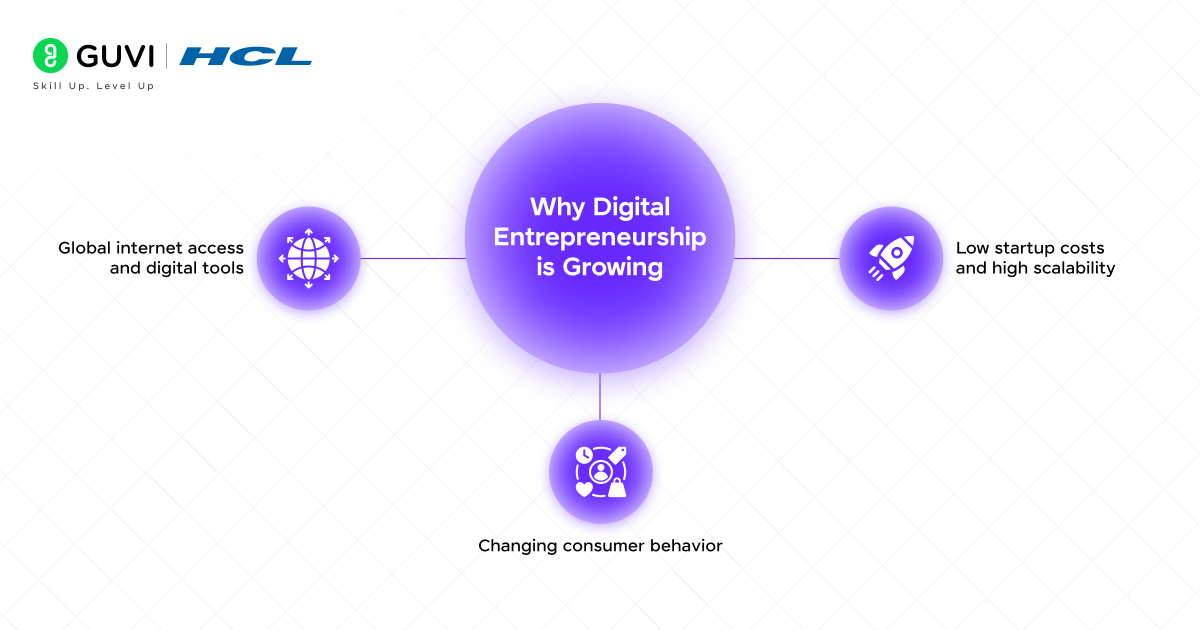
1) Global internet access and digital tools
The widespread availability of internet access has transformed entrepreneurship on a global scale. Today, businesses can reach customers anywhere with internet access, dramatically expanding potential markets. This global connectivity enables even small businesses to compete internationally—a scenario unimaginable just a decade ago.
2) Low startup costs and high scalability
One of the most compelling aspects of digital entrepreneurship is its minimal entry barriers. Unlike traditional businesses requiring substantial capital investment, digital ventures can often launch with just a computer and an internet connection.
3) Changing consumer behavior
Perhaps most notably, shifting consumer preferences have accelerated digital entrepreneurship growth. E-commerce experienced an unprecedented boom during the pandemic, with Shopify reporting ten years’ worth of growth in just three months.
Types of Digital Entrepreneurship
The digital economy offers multiple paths to entrepreneurship, each with unique advantages and challenges. Choosing the right business model is crucial for your success as a digital entrepreneur. Let’s explore the most popular types of digital entrepreneurship that are thriving in 2025.
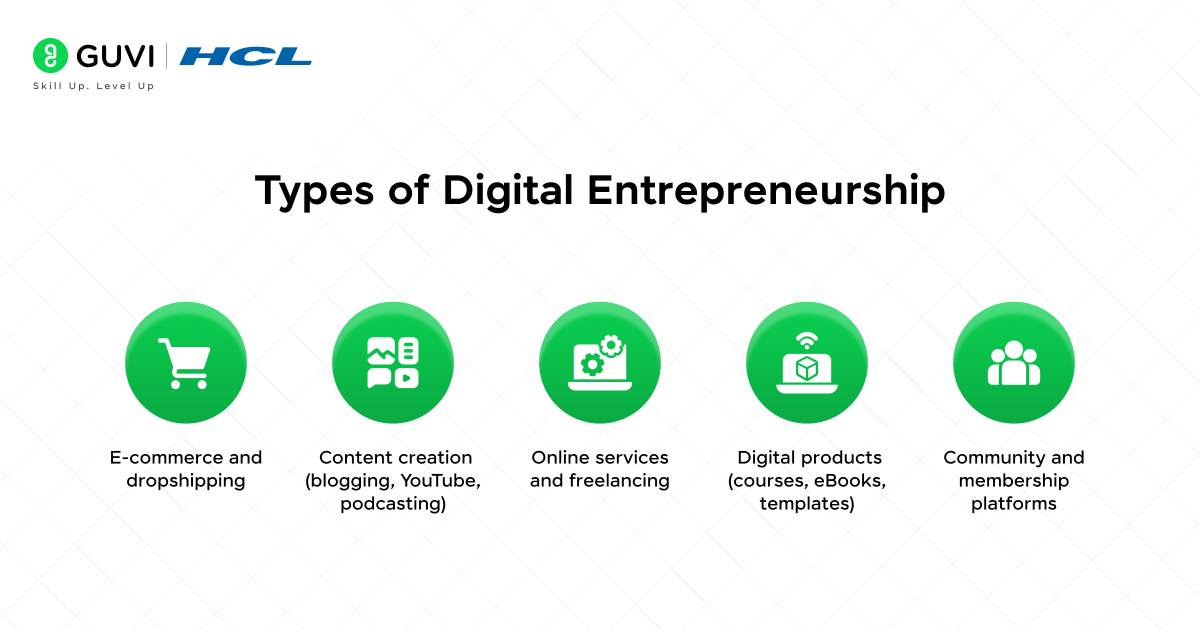
1) E-commerce and dropshipping
E-commerce remains one of the most accessible entry points into digital entrepreneurship. Global e-commerce sales reached a staggering ₹509 trillion in 2023 and are projected to hit ₹599 trillion by 2026. First and foremost, what makes this model attractive is the low barrier to entry.
Dropshipping, a specific e-commerce model, lets you sell products without holding inventory. When a customer places an order, your supplier handles packaging and shipping directly to them. This approach eliminates warehouse costs and unsold inventory risks.
2) Content creation (blogging, YouTube, podcasting)
Content creation has transformed how people build businesses online. As a result, a new creator class has emerged—professionals who use online platforms to share and monetize their expertise.
Each content format offers distinct advantages:
- Blogging: Excellent for SEO, versatile topics, and easy for writers. However, it’s time-consuming and faces declining attention spans.
- YouTube: Reaches over 2 billion monthly users, offers visual engagement, and provides multiple monetization opportunities. YouTube creators in the top 1% can earn approximately ₹12.5 lakh per video.
- Podcasting: Convenient for audiences, low barrier to entry (just needing a microphone and software), and creates loyal listeners—80% of podcast subscribers listen to most episodes.
3) Online services and freelancing
Freelancing platforms connect skilled professionals with clients worldwide. Specifically, popular services include graphic design, web development, writing, marketing, and software development.
On platforms like Freelancer and Upwork, you can build a business around your expertise with minimal startup costs. This model provides flexibility in location and working hours, making it particularly appealing for those just starting their digital entrepreneur journey.
4) Digital products (courses, eBooks, templates)
Digital products offer exceptional profit margins—up to 85% when selling courses at ₹8,000. The subscription economy has grown 435% in less than 10 years, demonstrating strong consumer demand.
Popular digital products include:
- Online courses: Structure your expertise into modules and lessons with video recordings
- eBooks: Simple to create and distribute, with no shipping costs
- Templates and plans: Sell business, financial, or design templates you already use
5) Community and membership platforms
Membership sites provide recurring revenue through subscription models. Consequently, they offer financial stability while building engaged communities around shared interests. Platforms like Mighty Networks and Thinkific allow entrepreneurs to mix content, courses, community, and events.
A successful membership business can add ₹30 lakh in annual recurring revenue with just 100 members. This model works especially well when combined with other digital entrepreneurship types, creating multiple income streams from your expertise.
Understanding these different models helps you choose the path that best matches your skills, interests, and resources—a critical first step in your digital entrepreneurship journey.
How to Become a Digital Entrepreneur: Step-by-Step
Turning your digital business idea into reality requires a systematic approach. Many successful digital entrepreneurs follow a proven roadmap that can dramatically increase their chances of success. Here’s how to navigate your journey step by step.
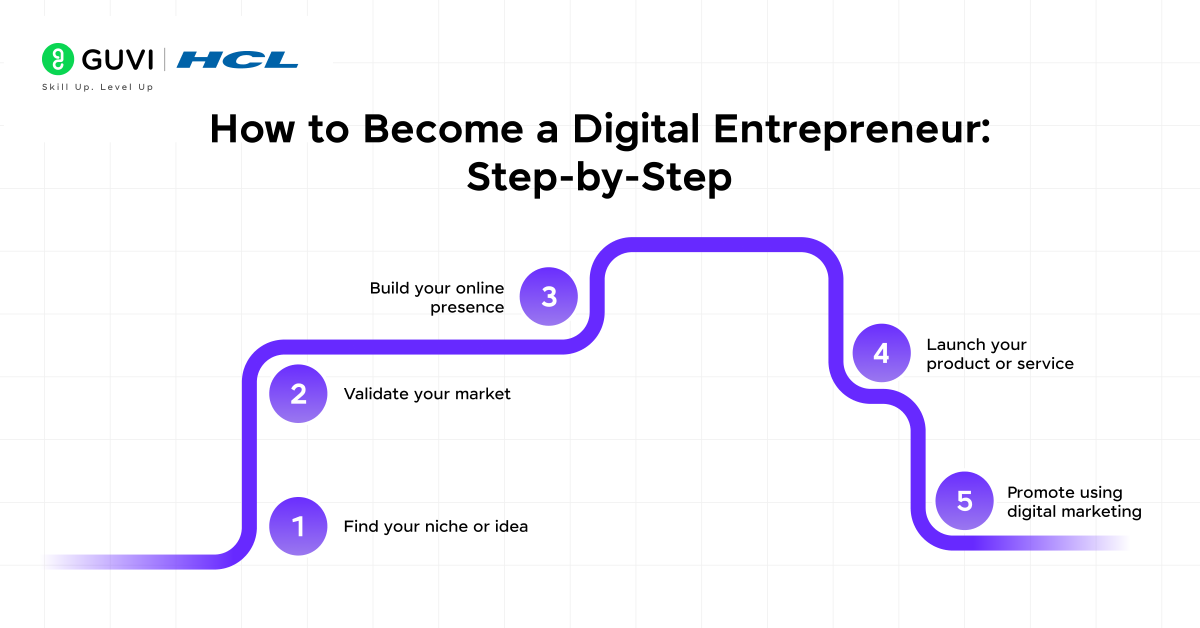
1. Find your niche or idea
Starting a digital business begins with identifying an opportunity that matches your strengths and interests. First, reflect on what excites you – your passions, skills, and experiences often point toward promising business ideas. Thereafter, consider these approaches:
- Look for problems you can solve in specific industries
- Identify your unique strengths that can create value for others
- Consider digital business models that align with your skills (content creation, e-commerce, online services)
Remember that choosing a niche you’re genuinely interested in significantly increases your chances of persevering through challenges. According to Chase, matching your skills with established business models works best, like becoming a content creator if you enjoy connecting with audiences, or starting an e-commerce store if you’re passionate about curating products.
2. Validate your market
Before investing significant resources, test whether people want what you’re offering. Start by researching your target audience and understanding their needs. Above all, gather real evidence through:
- Analyzing competitors to spot gaps in their offerings
- Using keyword research tools to assess search volume
- Creating a simple landing page to gauge interest
- Conducting interviews with potential customers
Market validation helps confirm there’s demand for your idea. Tools like Google Trends can show if interest in your topic is growing, stable, or declining – a crucial indicator of future viability.
3. Build your online presence
In today’s marketplace, your digital footprint establishes credibility. To begin with, create a professional website optimized for mobile users – 76% of Americans use smartphones for online purchases. Subsequently, focus on:
- Developing consistent branding across all platforms
- Creating relevant, valuable content that showcases your expertise
- Establishing profiles on social media platforms where your audience spends time
- Building an email list to nurture relationships with potential customers
4. Launch your product or service
Starting with a Minimum Viable Product (MVP) lets you test your concept without overinvestment. This approach involves launching a simplified version with just enough features to satisfy early adopters. Accordingly, your launch should include:
- Pre-launch marketing to build anticipation
- A roadmap for future development
- Systems for gathering customer feedback
- Clear metrics to measure success
5. Promote using digital marketing
Once launched, strategic promotion becomes crucial. Equally important to creating a great product is ensuring people know about it. Effective digital marketing strategies include:
- Content marketing to demonstrate expertise
- Search engine optimization to improve visibility
- Email marketing to nurture leads
- Strategic use of social media to engage with audiences
- PPC advertising to quickly boost reach
The average digital entrepreneur in India earns approximately ₹5-15 lakh annually, with top performers making significantly more as their businesses scale.
Skills and Tools You’ll Need to Become a Digital Entrepreneur
Succeeding as a digital entrepreneur requires mastering specific skills and utilizing the right tools. As you venture into what is digital entrepreneurship, these fundamentals will serve as your foundation for building a thriving online business.
1) Basic tech and marketing skills
First of all, you don’t need to be a coding expert to succeed in digital entrepreneurship. Nevertheless, a working knowledge of these skills is essential:
- Basic web design – Understanding how websites work and basic HTML/CSS principles
- Digital marketing fundamentals – Knowing how to reach your target audience online
- Content creation – Ability to write compelling copy, create videos, or design graphics
- Data analysis – Reading metrics to make informed business decisions
Many digital entrepreneurs in India start with just a few of these skills and learn others as they grow.
2) Popular tools for websites, email, and payments
The right digital tools can dramatically simplify your entrepreneurial journey:
- Website builders: Platforms like WordPress, Wix or Shopify help create professional websites without coding
- Email marketing: Tools such as Mailchimp or ConvertKit help manage subscriber lists and automate campaigns
- Payment processors: Razorpay, Instamojo, and PayPal enable you to collect payments securely
- Analytics: Google Analytics provides insights into visitor behavior and marketing effectiveness
3) Time management and adaptability
Managing your time effectively becomes crucial when juggling multiple responsibilities. Digital entrepreneurs often work across different roles simultaneously—from content creator to marketer to customer service representative.
To stay productive:
- Set clear daily priorities
- Block focused work time
- Use productivity apps like Notion or Trello
- Embrace continuous learning as digital trends evolve
4) Understanding customer needs
In the long run, understanding your audience determines your success. This means:
- Regularly collecting feedback through surveys and direct conversations
- Monitoring online reviews and social media comments
- Testing new ideas with small audience segments
- Tracking customer behavior on your digital properties
Ultimately, the most successful digital entrepreneurs combine these skills with consistent action. The typical digital entrepreneur salary in India ranges from ₹3-15 lakhs annually, with experienced professionals earning substantially more as they refine these essential skills and expand their ventures.
Want to turn your digital product idea into a real business? HCL GUVI’s Entrepreneurship Course equips you with practical strategies in product-market fit, digital branding, and startup fundraising—perfect for aspiring digital entrepreneurs ready to launch in 2025. And you get certified by IIT DELHI! I mean, what better institution than the top one in the country to teach and certify your skills?
Concluding Thoughts…
Digital entrepreneurship offers a remarkable opportunity to build a thriving business with minimal startup costs. Throughout this guide, you’ve learned what digital entrepreneurship entails—creating and managing ventures that operate primarily through digital channels.
Undoubtedly, this business model provides significant advantages over traditional approaches, including global reach, lower overhead, and exceptional scalability. Remember that becoming a digital entrepreneur follows a clear pathway: identify your niche, validate your market, build your online presence, launch your product, and promote strategically.
Start small, test your ideas quickly, and adjust based on feedback. After all, the most successful digital entrepreneurs aren’t necessarily the most technically skilled—they’re the ones who take consistent action while remaining responsive to market changes. Good Luck!
FAQs
Q1. What exactly is digital entrepreneurship?
Digital entrepreneurship involves creating and running a business primarily through online channels and digital technologies. It allows entrepreneurs to reach a global audience, operate with lower overhead costs, and scale more easily compared to traditional businesses.
Q2. How much can digital entrepreneurs earn?
The income of digital entrepreneurs varies widely, but on average, they can earn between ₹3-15 lakhs annually in India. Top performers and those with established businesses can make significantly more as they scale their ventures.
Q3. What skills do I need to become a digital entrepreneur?
Key skills for digital entrepreneurs include basic web design, digital marketing fundamentals, content creation, and data analysis. You don’t need to be an expert in all areas initially, but a willingness to learn and adapt is crucial.
Q4. What are some popular types of digital entrepreneurship?
Common types include e-commerce and dropshipping, content creation (blogging, YouTube, podcasting), online services and freelancing, selling digital products (courses, eBooks, templates), and running community or membership platforms.
Q5. How do I start my journey as a digital entrepreneur?
Begin by identifying your niche or business idea, validating your market, building an online presence, launching a minimum viable product or service, and promoting it through digital marketing strategies. Start small, test quickly, and be prepared to adapt based on feedback.


























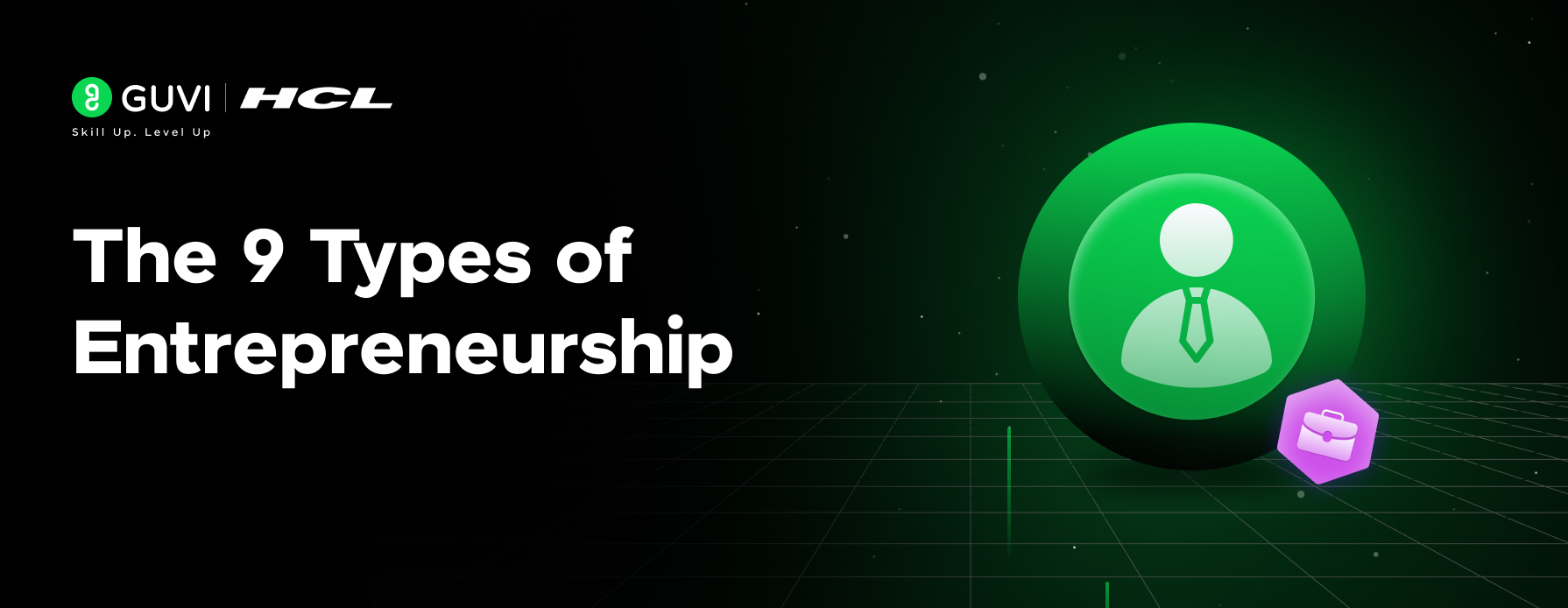









Did you enjoy this article?